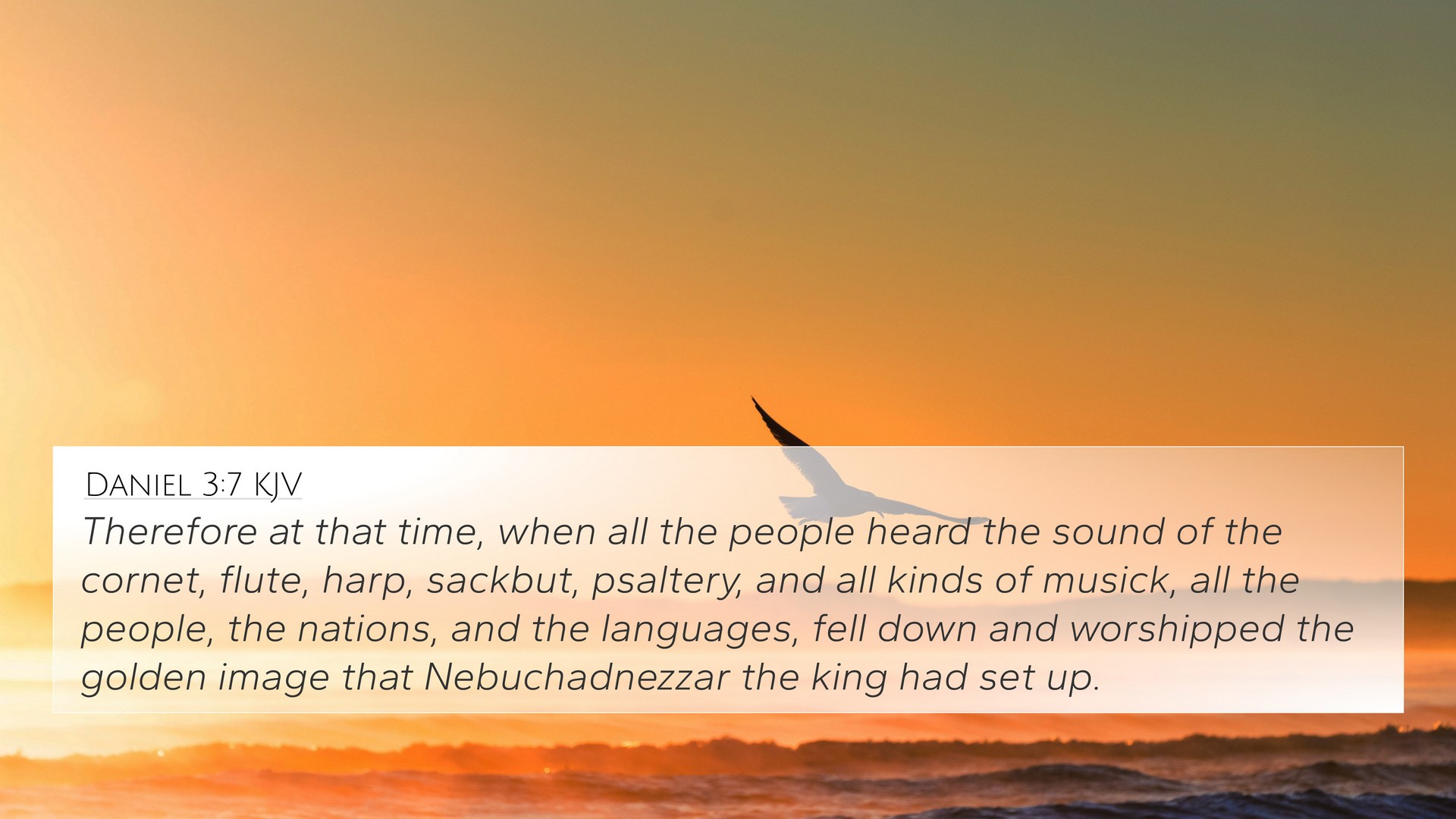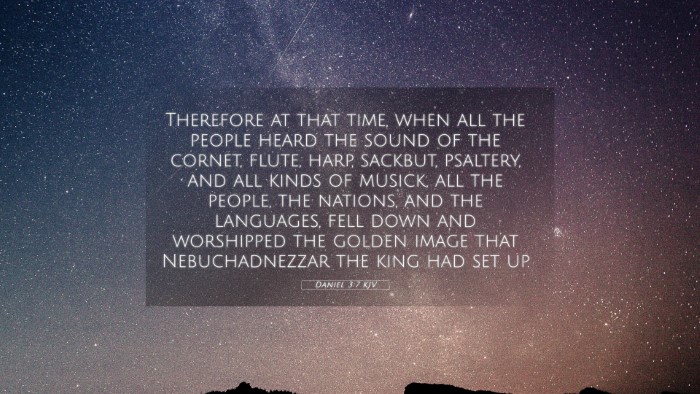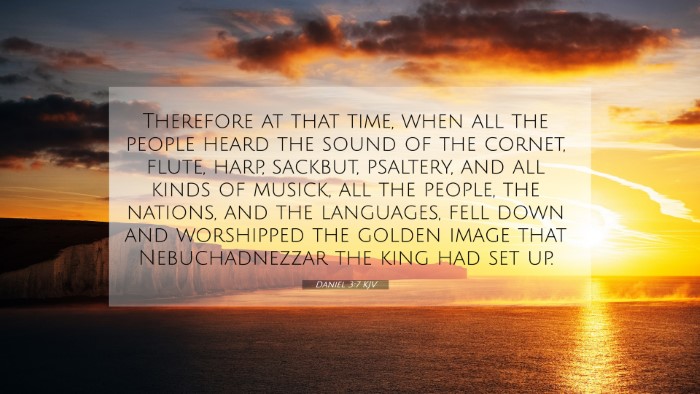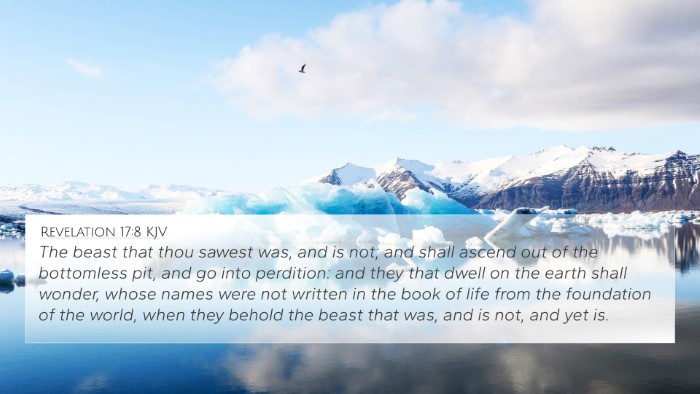Understanding Daniel 3:7
Daniel 3:7 narrates a significant moment during the Babylonian exile, highlighting the obedience of the people under King Nebuchadnezzar's decree to worship the golden image. This moment serves as an exemplary case of faith and the challenges that arise in maintaining one's beliefs in the face of authoritative power.
Verse Context
In the broader context of Daniel 3, we see King Nebuchadnezzar constructing a massive golden statue and mandating that all his subjects bow down and worship it. Verse 7 specifically captures the immediate response of the people to this decree:
"Therefore, at that time, when all the people heard the sound of the horn, flute, harp, lyre, and every kind of music, all the peoples, nations, and languages fell down and worshiped the golden image that King Nebuchadnezzar had set up."
Bible Verse Cross-References
- Exodus 20:3-5: This passage articulates the command against idolatry, which stands in direct contrast to the mandate of King Nebuchadnezzar.
- Isaiah 44:9-20: Here the futility of worshiping idols is emphasized, supporting the theme of refusing false gods.
- Philippians 2:10-11: This New Testament reference points to the ultimate lordship of Christ over all, contrasting with earthly kings.
- Revelation 13:15: This verse alludes to worshiping the beast, paralleling the dire choice faced by Daniel's companions.
- Acts 4:19-20: Reflects a similar defiance against human authority when it contradicts God's command.
- Deuteronomy 6:14: Warns against serving other gods, reiterating the importance of faithfulness to Yahweh.
- 1 Kings 18:21: Elijah's challenge to the people asking them to choose whom they will serve, highlighting the need for loyalty to God.
Commentary Insights
Matthew Henry's Commentary
Henry notes that this decree represents the king's attempt to assert his authority and draw allegiance away from the true God. He emphasizes that the response of the people indicates a submission to worldly pressure rather than divine command, shedding light on the struggles of faith in oppressive situations.
Albert Barnes' Commentary
Barnes highlights the broad scope of the king's command, underlining its reach to "all peoples, nations, and languages". This inclusivity indicates a systematic effort to unify the empire under one form of worship, which would challenge the individuality of faith held by the Jews and other groups.
Adam Clarke's Commentary
Clarke discusses the musical aspect of the event, pointing out how the allure of the pomp and ceremony could sway individuals to compliance. He argues that such cultural and societal temptations are relatable today and stresses the importance of discernment in distinguishing between genuine worship and mere conformity.
Thematic Bible Verse Connections
This verse presents several themes relevant to both the Old and New Testament, particularly those of idolatry, obedience, and faith under duress. The narrative invites readers to consider:
- The theological implications of servitude to God versus human authority.
- Individual versus collective worship practices and the moral struggles therein.
- The consequences of standing firm in faith amid cultural pressures to compromise.
Comparative Bible Verse Analysis
The links between Daniel 3:7 and other scriptures invite a deeper examination:
- Exodus 20:3-5 emphasizes the prohibition of idolatry, calling into question the legitimacy of Nebuchadnezzar’s command.
- Philippians 2:10-11 suggests that every knee will ultimately bow to God, reinforcing the futility of earthly powers.
- Acts 4:19-20 provides a New Testament example of prioritizing God's command over human law.
Inter-Biblical Dialogue
Daniel 3:7 serves as a springboard for discussions across the biblical narrative regarding faith and fidelity. Many stories resonate with this theme:
- The refusal of Shadrach, Meshach, and Abednego to worship the idol (Daniel 3:16-18).
- The faith of the apostles as documented in the Acts of the Apostles.
- Old Testament figures like Abraham, who demonstrated unwavering faith despite overwhelming odds.
Conclusion
In reflecting on Daniel 3:7 and its implications, believers are encouraged to evaluate their own spiritual allegiances and the ways societal pressures may lead to compromise. The richness of inter-Biblical discussions, alongside thematic connections and cross-references, reveals a consistent call for faithfulness to God amidst trials.











